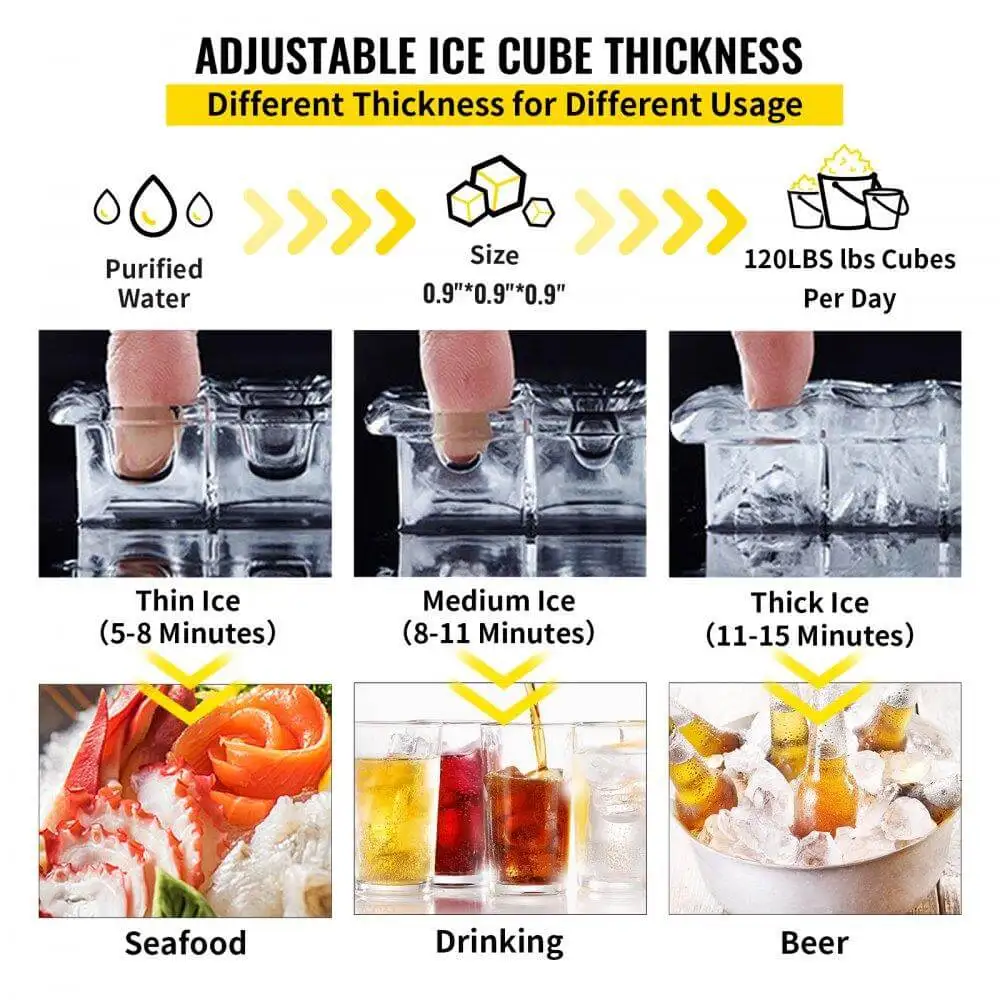Answer
This question has not yet been answered.

The thickness of your ice cubes can make or break their performance. Too thick? They take ages to freeze and hog up space. Too thin? They melt faster than a snowman in July.
The problem that you may face when your ice maker produces ice too thin or thick is that your drinks won’t be chilled properly. Another problem this situation gives rise to is that your ice maker would be working more than it needs to. Thus, it is important that your ice maker adjustment is properly done.
But before we get into these details, we need to address the reasons behind the ice maker adjustment problem. Below, we look into the different reasons that can make your ice maker produce too thin or thick ice.
Reasons Why Your Ice Machine is Making Thin IceThe issue of thin ice usually has three culprits: temperature woes, stingy water flow, or wrong settings. In order to help you understand better, all three reasons are discussed in more detail below.
Temperature TroublesThe space encircling your ice maker significantly influences how well it produces the ice. If this area is hotter or colder than normal, chances are your ice will come out looking less than ideal. Machines prefer cooler, stable conditions to function at their peak.
To fix this frosty dilemma, make sure your unit isn’t basking in direct sunlight or sitting next to heat-producing equipment. A steady ambient temperature keeps those cubes chunky.
Uneven Water FlowQuality water flow is extremely important for your ice maker to work well. Low water pressure can lead to incomplete fills of the mold tray, resulting in thinner-than-usual ice slabs that melt very fast.
Adjusting the water inlet valve could solve this problem by ensuring enough water gets through. Also, consider installing a filter system if hard water is suspected of clogging up the works.
Inappropriate SettingsLastly, ice maker settings matter more than we think. Read the manual (or find one online) and experiment with these adjustments; sometimes, all it takes is turning a dial or pressing some buttons more confidently.
Tweaking these settings not only fine-tunes your approach to chilling drinks but also boosts the machine’s effectiveness and durability, ensuring each beverage is properly chilled.
 https://diy-ideas.oss-accelerate.aliy... 300w, https://diy-ideas.oss-accelerate.aliy... 150w, https://diy-ideas.oss-accelerate.aliy... 768w" alt="adjustable ice cube thickness" width="1000" height="1000" />
https://diy-ideas.oss-accelerate.aliy... 300w, https://diy-ideas.oss-accelerate.aliy... 150w, https://diy-ideas.oss-accelerate.aliy... 768w" alt="adjustable ice cube thickness" width="1000" height="1000" />Getting the perfect ice cube thickness from your VEVOR Ice Machine isn’t just a matter of preference. Making sure your drinks have the right flavor relies on getting the perfect-sized ice chunks, which begins with mastering the adjustment knobs for ice density.
Step-by-Step Guide on Adjusting Your Ice Cube ThicknessIf you’ve noticed your cocktails are watery or your soda fizzles out too fast, it might be time to tweak those settings. Here’s how:
Making sure you have just the right ice cube thickness impacts not only drink quality but also machine performance. Thicker cubes take longer to freeze, putting less strain on your machine during each cycle but potentially leading to underproduction issues if set too thickly, whereas thinner cubes may lead to faster wear from frequent cycles despite boosting output numbers.
Why My Ice Maker is Making Hollow Cubes?Hollow cubes usually happen when there’s not enough water flowing into your machine. It could also mean that the freezing cycle is too fast, resulting in shells instead of solid cubes.
What is the Function of the Ice Thickness Probe in an Ice Maker?The thickness probe in your ice machine acts like a diligent guard. It lets you know when there is extra ice accumulated in the ice maker, thus allowing you to empty it on time.
What is the Recommended Ice Thickness?Ideal cube size isn’t just about fitting into glasses nicely; it’s about the balance between being robust and melting slowly so as not to dilute drinks quickly. Aim for 3/4 inches, a size that ensures maximum satisfaction, whether you’re shaking cocktails or cooling sodas.
Do you have the same question? Follow this Question
This question has not yet been answered.
We look to ensure that every question is answered by the best people with relevant expertise and experience, the best answers include multiple perspectives. Do you have relevant expertise or experience to contribute your answer to any of these commonly asked questions?

Add New Comment